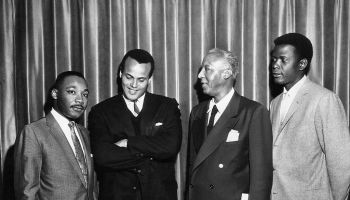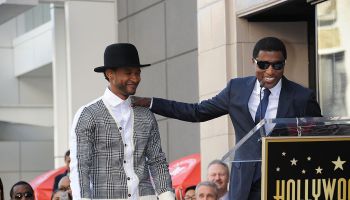Tribewanted Sierra Leone is a cross-cultural community committed to developing eco-tourism in a country that has been at peace for 10 years.
Visiting travelers can experience an authentic village community in one of the most beautiful and vibrant destinations in Western Africa all while participating in the local area development.
Filippo Bozotti, Tribewanted Sierra Leone’s founding partner, has been working and visiting the region on-and-off for five years now and will embark on another season living in the John Obey community.
Filippo had a few minutes to talk to us about what he expects this season, the future of Tribewanted and what you can do to help.
Check out our exclusive interview below and on the next few pages!
GlobalGrind: When people hear ‘Sierra Leone’ they think of diamonds and sadly, kids getting their hands chopped off. What’s the biggest misconception about the work that Tribewanted is doing?
The biggest challenge for us, but also the biggest opportunity, is to change the narrative of the country from a negative one to a positive one.
I think that was our biggest success last year as we launched Tribewanted and also early on, as we put out a lot of positive media about the country. It’s been at peace for 10 years, it went through a violent civil war, but they are sick of talking about it, they are tired of talking about it and they want to move on.
It’s poor, so they need some kind of sustainable development to help it grow and it also needs tourism, especially a kind of equal tourism that promotes the local culture and the local environment.
It has been untouched as far as tourism goes and so we have the opportunity to do it right.
[pagebreak]
You’ve been visiting Sierra Leone and working there for five years now, what’s the craziest thing you’ve seen, something you remember the most?
I have been working there since 2006, when I did a documentary for VH1 and the UN in 2006 and 2007 called Bling. It was about the link between blood diamonds in Sierra Leone and hip-hop in the U.S.
Crazy things happen every day in Sierra Leone, that’s one of the most interesting aspects of it. On some level, it’s kind of like Murphy’s Law, everyday you have to assume that something unexpected will happen to slow you down and take you off course.
But there are a lot of really positive things happening in the county, the tide is turning.
Life is very cheap here, you see people dying who shouldn’t die, usually from diseases that are easily curable in 24 hours. You see little babies dying that shouldn’t be dying, a lot of people actually drown in the ocean.
In the time that we were there in the last year, at least 4 or 5 people drowned on beaches or in shallow lagoons, in places they should never have drowned in.
That’s the worst thing: how cheap life is. On the other hand, you hear some really incredible stories of resilience, both from the people and also just the sheer beauty of the environment, which is what I miss the most when I come back.
[pagebreak]
You guys have done tremendous work there. You have built schools and community centers around the country. How are the students? Are they hip to things like Facebook or Twitter? Are they engaged in the social media world?
They try to be, but the problem for them is that there is no high speed internet connection. Because the country was skipped, they didn’t lace fiber optic cables during the war.
I would say there is only internet in three towns in the capital. The youth in the capital use social media. You can walk into some building or a café and it’s hot as hell and it’s full of people working on 26k, it’s incredibly slow.
But most of them are on Facebook. Twitter not so much, but everyone uses Facebook. As soon as you enter the provinces, though, they have never seen internet.
When we pull out internet on our beach and in our village, the people crowd around us because they are interested to see something they have never seen before.
[pagebreak]
The census bureau recently revealed that people ages 16 to 29, young people of our generation, don’t have anything in America, no jobs. If I am a young person, why should I come join you guys in Tribewanted?
It’s a life changing experience for anybody who comes and it really puts everything into perspective. Most people that join come back a different person.
First of all, you learn that it is possible to live sustainably. Here at Tribewanted, we use 5 percent of the water and 5 percent of the electricity that the average American uses and yet we have everything that we need, it’s all solar power.
And the experience doesn’t end at Tribewanted. You come back and spread the word, or maybe you switch to green energy, those kinds of things.
In general, it’s cross-cultural and ours is incredibly authentic, we live right next door and we work with, we eat with, we play with this kind of fisherman community.
These really authentic cross-cultural experiences are a great learning curve for both. We are not there to just give back or help, we are also learning from them and we are teaching.
The cross-cultural experience is what makes it great and I think that is one of the most important reasons why the young people in America should visit Tribewanted.
[pagebreak]
How is the daily life there?
We live with the sun, so we wake up early and go to sleep pretty early and it’s great.
We all wake up and have breakfast together; we have our daily meeting with our staff which is about 25 people in all; our visiting international tribe members.
We talk about all the things that we have to do and it’s like a family.
We work all day, we all have lunch together on this big table at the beach and we eat local African food, like a bowl of rice with cassava or ground nut soup and stuff like that. After work we usually play on the beach, we play volleyball or soccer.
We work out on the beach; there are a million things to do, like hikes when it gets a little cooler. Or you could go out fishing with the fishermen; they usually go out fishing after dusk.
Then we usually have dinner at 7:30. Dinner is usually fresh fish. It’s more like a westerner’s meal with salad and fruits.
After that we all sit around the bonfire and drink palm wine at night on the beach. Palm wine is like the local brew that comes straight from the saps of the palms.
And then you just fall asleep under a kind of canopy of stars. I’ve lived in a tent for six months but now we have this bungalow we developed and it’s really cool.
You can check out everything the Tribewanted community is doing by heading o
ver to their Facebook page for videos and photos.
















